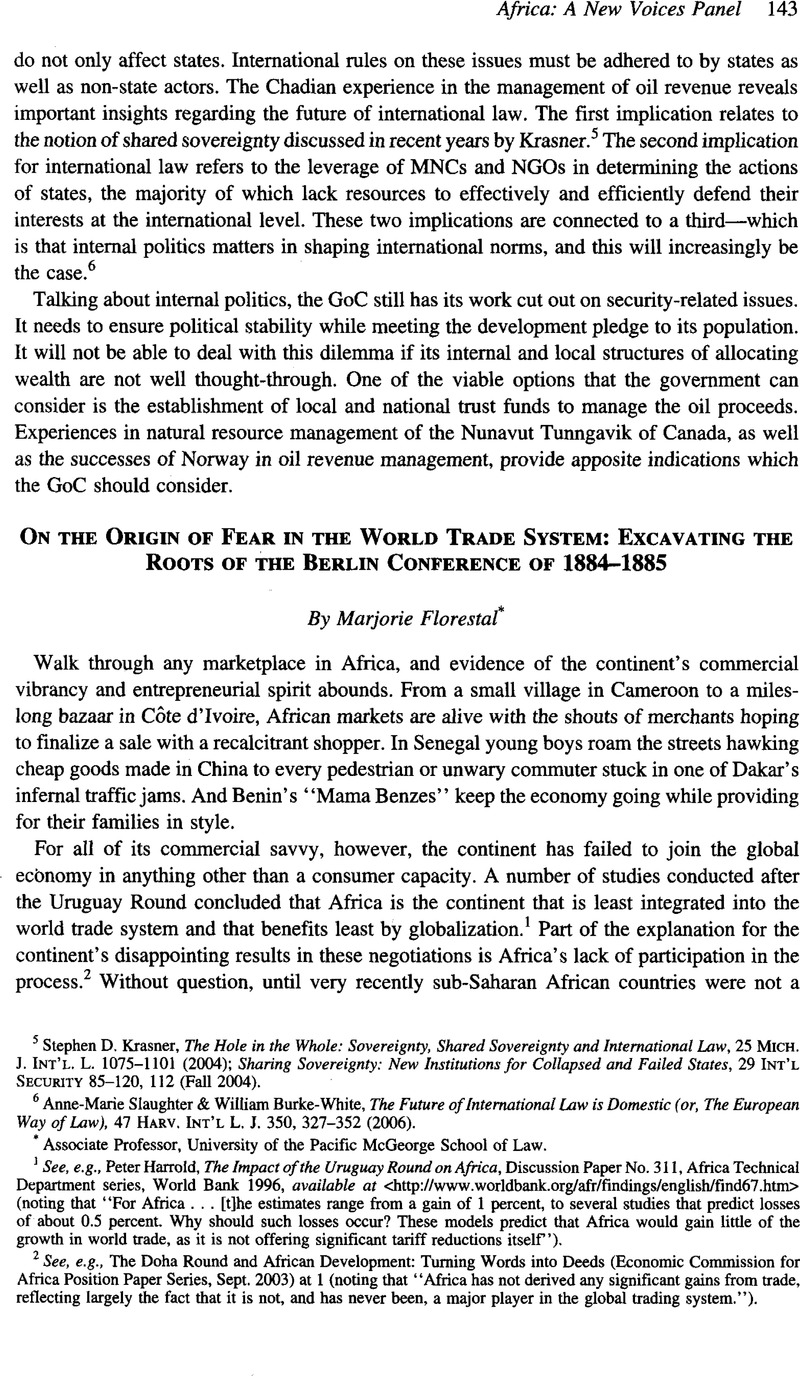Article contents
On the Origin of Fear in the World Trade System: Excavating the Roots of the Berlin Conference of 1884–1885
Published online by Cambridge University Press: 28 February 2017
Abstract

- Type
- Africa: A New Voices Panel
- Information
- Copyright
- Copyright © American Society of International Law 2007
References
1 See, e.g., Peter Harrold, The Impact of the Uruguay Round on Africa, Discussion Paper No. 311, Africa Technical Department series, World Bank 1996, available at <http://www.worldbank.org/afr/findings/english/find67.htm> (noting that “For Africa . . . [t]he estimates range from a gain of 1 percent, to several studies that predict losses of about 0.5 percent. Why should such losses occur? These models predict that Africa would gain little of the growth in world trade, as it is not offering significant tariff reductions itself).
2 See, e.g., The Doha Round and African Development: Turning Words into Deeds (Economic Commission for Africa Position Paper Series, Sept. 2003) at 1 (noting that “Africa has not derived any significant gains from trade, reflecting largely the fact that it is not, and has never been, a major player in the global trading system.”).
3 T. N. Smnivasan, Gatt to the Uruguay Round and the Future 25 (1998).
4 Axelle Kabou, Et Si L’Afrique Refusait Le Developpement? (And if Africa Refuses Development?) 17 (1999).
5 Kabou maintains:
The sociological and especially psychological conditions for the success of free enterprise are not yet present in sub-Saharan Africa. Their emergence depends first on the commencement of an immense debate on the connection between development and the mentality of Africans post-independence.
Supra note 4. Kabou’s premise has found favor with other Africanists seeking explanations for Africa’s economic performance. See e.g., Alternatives Sud, Et Si L’Afrique Refusait Le Marche? (And if Africa Refuses the Market?) (2003).
6 The General Act of the Berlin Conference, Article 11.
7 Shepperson, George, 46 The Centennial of the West African Conference of Berlin, 1884-1885, at 41 (1985)Google Scholar.
8 See The General Act of the Berlin Conference, preamble, Articles I, III, IV, and V.
9 The General Act of the Berlin Conference, Preamble.
10 See Minow, Martha, Institutions and Emotions: Redressing Mass Violence, in The Passions of Law 271 (Bendes, Susan ed., 1999)Google Scholar (noting that institutions often “serve[] to channel emotional energy that would otherwise take a destructive form.”); see also Moran, Rachel F. Law and Emotion: Love and Hate, 11 J. Contemp. Legal Issues 747 (2000)Google Scholar (exploring the use of hate crimes criminal laws and torts for seduction and alienation of affection); Dorfman, Deborah A. Through a Therapeutic Jurisprudence Filter: Fear and Pretextuality in Mental Disability Law, 10 N.Y.L. J. Hum.. Rts. 805, 808 (1992)Google Scholar (noting that “[m]uch of the anxiety we feel towards those with mental disabilities stems from our belief that they are dangerous. . . . Our fears are manifested through political pressure on legislators, particularly at the state and local levels, narrowing the legal rights of the mentally ill.”)
- 1
- Cited by


